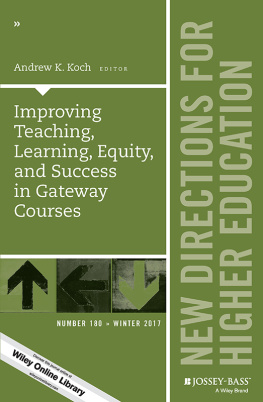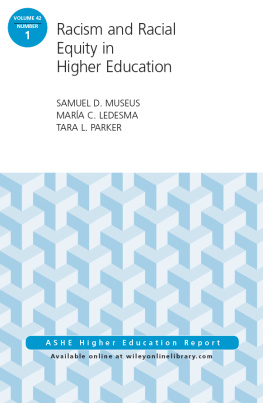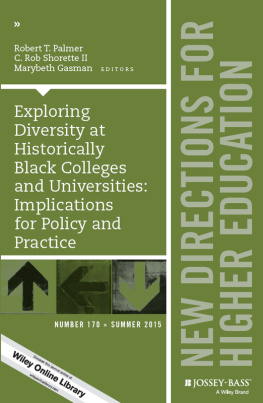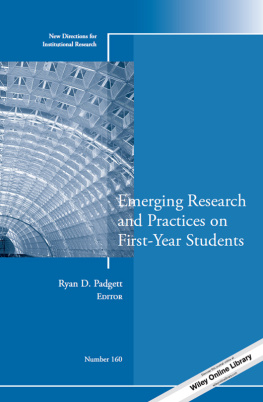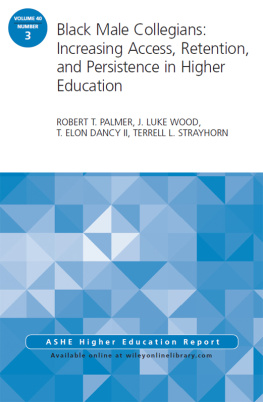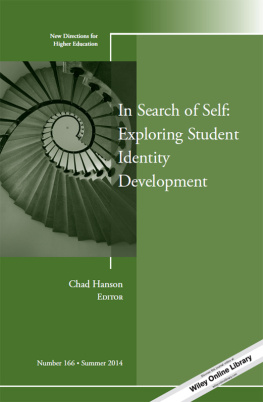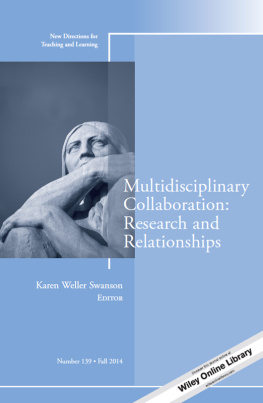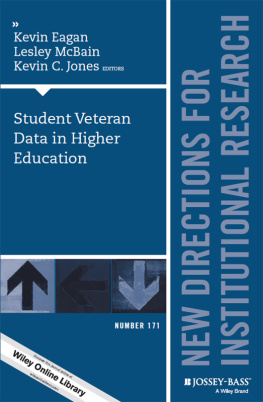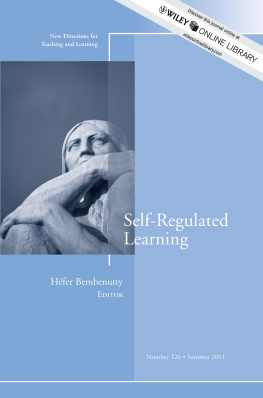
Improving Teaching, Learning, Equity, and Success in Gateway Courses
Andrew K. Koch
New Directions for Higher Education, no. 180
Coeditors: Betsy O. Barefoot and Jillian L. Kinzie
NEW DIRECTIONS FOR HIGHER EDUCATION, (Print ISSN: 02710560; Online ISSN: 15360741), is published quarterly by Wiley Subscription Services, Inc., a Wiley Company, 111 River St., Hoboken, NJ 070305774 USA.
Postmaster: Send all address changes to NEW DIRECTIONS FOR HIGHER EDUCATION, John Wiley & Sons Inc., C/O The Sheridan Press, PO Box 465, Hanover, PA 17331 USA.
Copyright and Copying (in any format)
Copyright 2017 Wiley Periodicals, Inc., a Wiley Company. All rights reserved. No part of this publication may be reproduced, stored or transmitted in any form or by any means without the prior permission in writing from the copyright holder. Authorization to copy items for internal and personal use is granted by the copyright holder for libraries and other users registered with their local Reproduction Rights Organisation (RRO), e.g. Copyright Clearance Center (CCC), 222 Rosewood Drive, Danvers, MA 01923, USA (
Information for subscribers
New Directions for Higher Education is published in 4 issues per year. Institutional subscription prices for 2017 are:
Print & Online: US$454 (US), US$507 (Canada & Mexico), US$554 (Rest of World), 363 (Europe), 285 (UK). Prices are exclusive of tax. AsiaPacific GST, Canadian GST/HST and European VAT will be applied at the appropriate rates. For more information on current tax rates, please go to www.wileyonlinelibrary.com/tax-vat. The price includes online access to the current and all online backfiles to January 1st 2013, where available. For other pricing options, including access information and terms and conditions, please visit www.wileyonlinelibrary.com/access.
Delivery Terms and Legal Title
Where the subscription price includes print issues and delivery is to the recipient's address, delivery terms are Delivered at Place (DAP); the recipient is responsible for paying any import duty or taxes. Title to all issues transfers FOB our shipping point, freight prepaid. We will endeavour to fulfil claims for missing or damaged copies within six months of publication, within our reasonable discretion and subject to availability.
Back issues: Single issues from current and recent volumes are available at the current single issue price from .
Disclaimer
The Publisher and Editors cannot be held responsible for errors or any consequences arising from the use of information contained in this journal; the views and opinions expressed do not necessarily reflect those of the Publisher and Editors, neither does the publication of advertisements constitute any endorsement by the Publisher and Editors of the products advertised.
Publisher: New Directions for Student Leadership is published by Wiley Periodicals, Inc., 350 Main St., Malden, MA 021485020.
Journal Customer Services: For ordering information, claims and any enquiry concerning your journal subscription please go to www.wileycustomerhelp.com/ask or contact your nearest office.
Americas: Email: ; Tel: +1 781 388 8598 or +1 800 835 6770 (toll free in the USA & Canada).
Europe, Middle East and Africa: Email: ; Tel: +44 (0) 1865 778315.
Asia Pacific: Email: ; Tel: +65 6511 8000.
Japan: For Japanese speaking support, Email: .
Visit our Online Customer Help available in 7 languages at www.wileycustomerhelp.com/ask
Production Editor: Abha Mehta (email: ).
Wiley's Corporate Citizenship initiative seeks to address the environmental, social, economic, and ethical challenges faced in our business and which are important to our diverse stakeholder groups. Since launching the initiative, we have focused on sharing our content with those in need, enhancing community philanthropy, reducing our carbon impact, creating global guidelines and best practices for paper use, establishing a vendor code of ethics, and engaging our colleagues and other stakeholders in our efforts. Follow our progress at www.wiley.com/go/citizenship
View this journal online at wileyonlinelibrary.com/journal/he
Wiley is a founding member of the UNbacked HINARI, AGORA, and OARE initiatives. They are now collectively known as Research4Life, making online scientific content available free or at nominal cost to researchers in developing countries. Please visit Wiley's Content Access Corporate Citizenship site: http://www.wiley.com/WileyCDA/Section/id-390082.html
Address for Editorial Correspondence: Coeditors, Betsy Barefoot and Jillian L. Kinzie, New Directions for Higher Education, Email:
Abstracting and Indexing Services
The Journal is indexed by Academic Search Alumni Edition (EBSCO Publishing); Higher Education Abstracts (Claremont Graduate University); MLA International Bibliography (MLA).
Cover design: Wiley
Cover Images: Lava 4 images | Shutterstock
For submission instructions, subscription and all other information visit:
wileyonlinelibrary.com/journal/he
Editor's Notes
Gateway coursescollege creditbearing and/or developmental education courses that enroll large numbers of students and have high rates of Ds, Fs, withdrawals, and incompletes (Koch & Rodier, 2016)are a ubiquitous part of the undergraduate experience in the United States. As long as there have been U.S. colleges and universities, there have been entry courses that pose difficulties for studentscourses that have served more as weeding-out rather than gearing-up experiences for undergraduates. Perhaps the gateway-course weed-out function was more appropriate in the days when a college or university credential was reserved for a privileged few, or even during the era when a high school credential was more than adequate preparation for work and life in a democratic republic. But we no longer live in those times.
I believe that the gateway-course weed-out dynamic is no longer acceptableif it ever was. Contemporary postsecondary education is characterized by vastly expanded access for historically underserved populations of students, and this new level of access is coupled with increased scrutiny of retention and graduation outcomes. Many of those outcomes are less than desirable. Academic difficulties in gateway courses are particularly pronounced for underserved students who, along with their families, are being expected to bear an increasing portion of the financial burden of postsecondary education. As a result of these less-than-desirable course outcomes and the lower retention rates that correlate with them, policy makers are questioning the investment of public monies in postsecondary education, and students and their families question that value of the college experience itself.
Make no mistake: I am not arguing that a solution to the gateway-course problem is watering down course rigor and content, nor are the other chapter authors in this volume. We believe that those who teach gateway courses and the institutions that offer them must uphold academic standards. But we maintain that they must do so by incorporating the latest evidence-based teaching, learning, and support strategies and by making sure that what happens in the gateway classroom is not contributing to the creation of a permanent underclass. There are tremendous institutional-viability and social-justice implications at play here.
This volume can serve as a resource for those who seek ways to improve teaching and learning in courses that have historically high failure rates. As a result, the volume can also contribute to the improvement of gateway-course outcomes and completion ratesespecially for America's most historically underserved and underprivileged populations that comprise an ever-increasing portion of the student body.
Next page
